Find all the local maxima local minima and saddle points of
Solution
1 ) Given that
f(x,y) = x2 - 4xy + y2 +12y + 2
fx = f/x = 2x - 4y
fy = f /y = -4x +2y + 12
For finding stationary points ,
fx=0 , fy = 0
2x - 4y = 0
2x = 4y ....................................................1
-4x + 2y = -12
2( -2x + y ) = -2.6
-2x + y = -6
2x = y + 6.........................................2
Equating the equations 1 and 2
4y = y + 6
4y - y = 6
3y = 6
y = 6/3
y = 2
Substitute y = 2 in equation 1
2x = 4y
2x = 4(2)
2x = 8
x = 8/2
x = 4
Therefore,
Stationary point is , ( x , y ) = ( 4 , 2 )
fxx = 2f / x2
= /x(2x - 4y)
= 2
fyy = 2f/y2
= /y(-4x +2y + 12)
= 2
fxy = 2f / xy = -4
We compute,
fxx.fyy - f2xy = 2.2 - (-4)2
= 4 - 16
= -12 < 0
fxx.fyy - f2xy < 0 then the stationary point is saddle point
Hence, (4 , 2 ) is a saddle point
2 ) Given that
f(x,y) = 2x2 + 3xy + 4y2 - 7x - 11y
fx = f/x = 4x + 3y - 7
fy = f /y = 3x + 8y - 11
For finding stationary points ,
fx=0 , fy = 0
4x + 3y - 7 = 0
4x + 3y = 7..........................1
3x + 8y - 11 = 0
3x + 8y = 11..............................2
On solving equations 1 and 2
( x , y ) = ( - 89/23 , 65/23)
We compute,
fxx = 2f / x2
= /x( 4x + 3y - 7 )
= 4
fyy = 2f/y2
= /y(3x + 8y - 11)
= 8
fxy = 2f / xy = 3
We compute,
fxx.fyy - f2xy = 4.8 - (3)2
= 32 - 9
= 23 > 0
fxx.fyy - f2xy > 0 then the stationary point is either local maximum or local minimum
Since fxx < 0 and fyy < 0 it is a local maximum.
fxx > 0 and fyy > 0 it is a local miniimum.
Here,
fxx = 4 > 0
fxx > 0
fyy = 8 > 0
fyy > 0
Hence,
fxx > 0 , fyy > 0 then the stationary point ( x , y ) = ( - 89/23 , 65/23) is local minimum
Therefore,
The function is local minimum at ( - 89/23 , 65/23)
3 ) Given that
f(x,y) = 15x2 -2x3 +3y2 + 6xy
fx = f/x = 30x - 6x + 6y = 24x + 6y
fy = f /y = 6y + 6x = 6x + 6y
For finding stationary points ,
fx=0 , fy = 0
24x + 6y = 0
6y = -24x..........................1
6x + 6y = 0
6y = -6x..............................2
Solving equations 1 and 2
Equating the equations 1 and 2
-24x = -6x
-24x + 6x = 0
-18x = 0
x = 0
Substitute x = 0 in equation 1
6y = -24x
6y = -24(0)
6y = 0
y = 0
( x , y ) = ( 0 , 0)
We compute,
fxx = 2f / x2
= /x( 24x + 6y )
= 24
fyy = 2f/y2
= /y( 6x + 6y)
= 6
fxy = 2f / xy = 6
We compute,
fxx.fyy - f2xy = 24.6 - (6)2
= 144 - 36
= 108 > 0
fxx.fyy - f2xy > 0 then the stationary point is either local maximum or local minimum
Since fxx < 0 and fyy < 0 it is a local maximum.
fxx > 0 and fyy > 0 it is a local miniimum.
Here,
fxx = 24 > 0
fxx > 0
fyy = 6 > 0
fyy > 0
Hence,
fxx > 0 , fyy > 0 then the stationary point ( x , y ) = ( 0 , 0) is local minimum
Therefore,
The function is local minimum at ( 0 , 0 )
4 ) Given that
f(x , y ) = x2 + xy + y2 +4x - 4y + 6
fx = f/x = 2x + y + 4
fy = f /y = x + 2y - 4
For finding stationary points ,
fx=0 , fy = 0
2x + y + 4= 0
2x + y = - 4..........................1
x + 2y - 4 = 0
x + 2y = 4..............................2
Solving equations 1 and 2
Multiply equation 2 with 2
x + 2y = 4
2x + 4y = 8
2x = 8 - 4y..................................3
From equation 1
2x + y = -4
2x = - 4 - y...............................4
Solve equations 3 and 4
2x = 8 - 4y
2x = - 4 - y
Equating the equations 3 and 4
8 - 4y = - 4 - y
-4y + y = -4 - 8
-3y = -12
y = 4
Substitute y = 4 in equation 3
2x = 8 - 4y
2x = 8 - 4(3)
2x = 8 - 12
2x = -4
x = -2
( x , y ) = ( - 2 , 3 )
We compute,
fxx = 2f / x2
= /x( 2x+y+4 )
= 2
fyy = 2f/y2
= /y(x+2y-4)
= 2
fxy = 2f / xy = 1
We compute,
fxx.fyy - f2xy = 2.2 - (1)2
= 4 - 1
= 3 > 0
fxx.fyy - f2xy > 0 then the stationary point is either local maximum or local minimum
Since fxx < 0 and fyy < 0 it is a local maximum.
fxx > 0 and fyy > 0 it is a local miniimum.
Here,
fxx = 2 > 0
fxx > 0
fyy = 2 > 0
fyy > 0
Hence,
fxx > 0 , fyy > 0 then the stationary point ( x , y ) = ( -2 , 3) is local minimum
Therefore,
The function is local minimum at ( -2 , 3 )
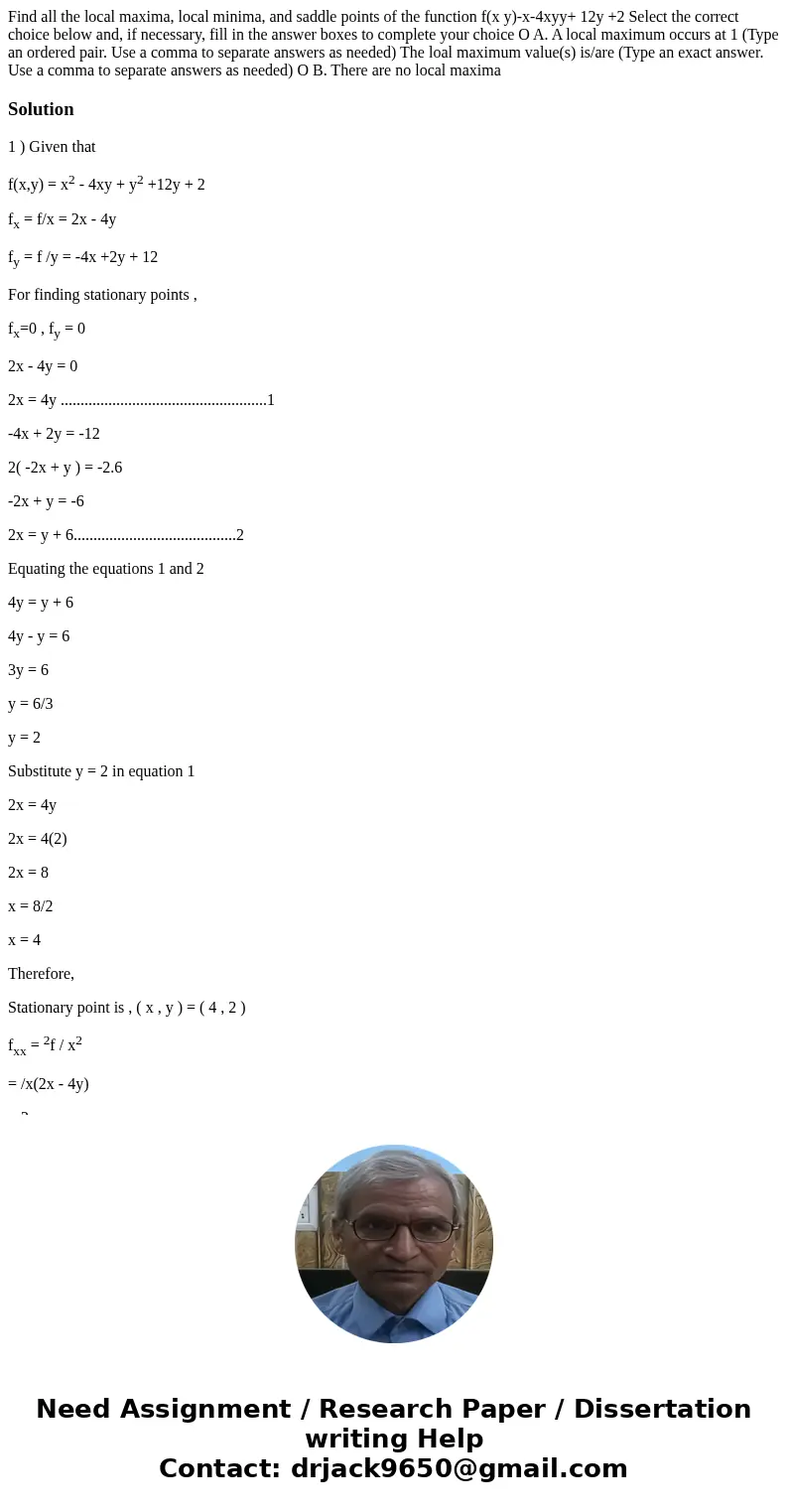
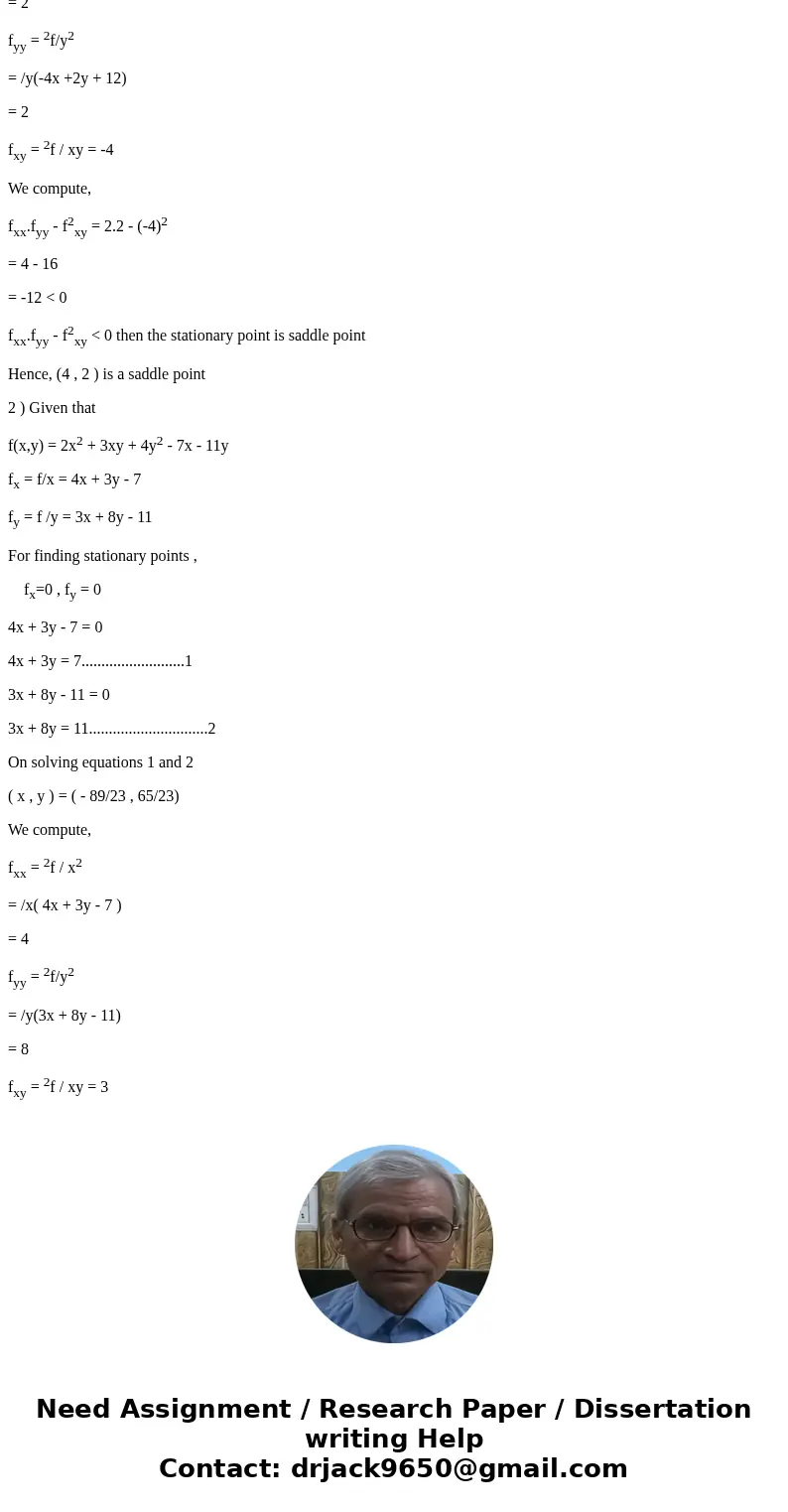
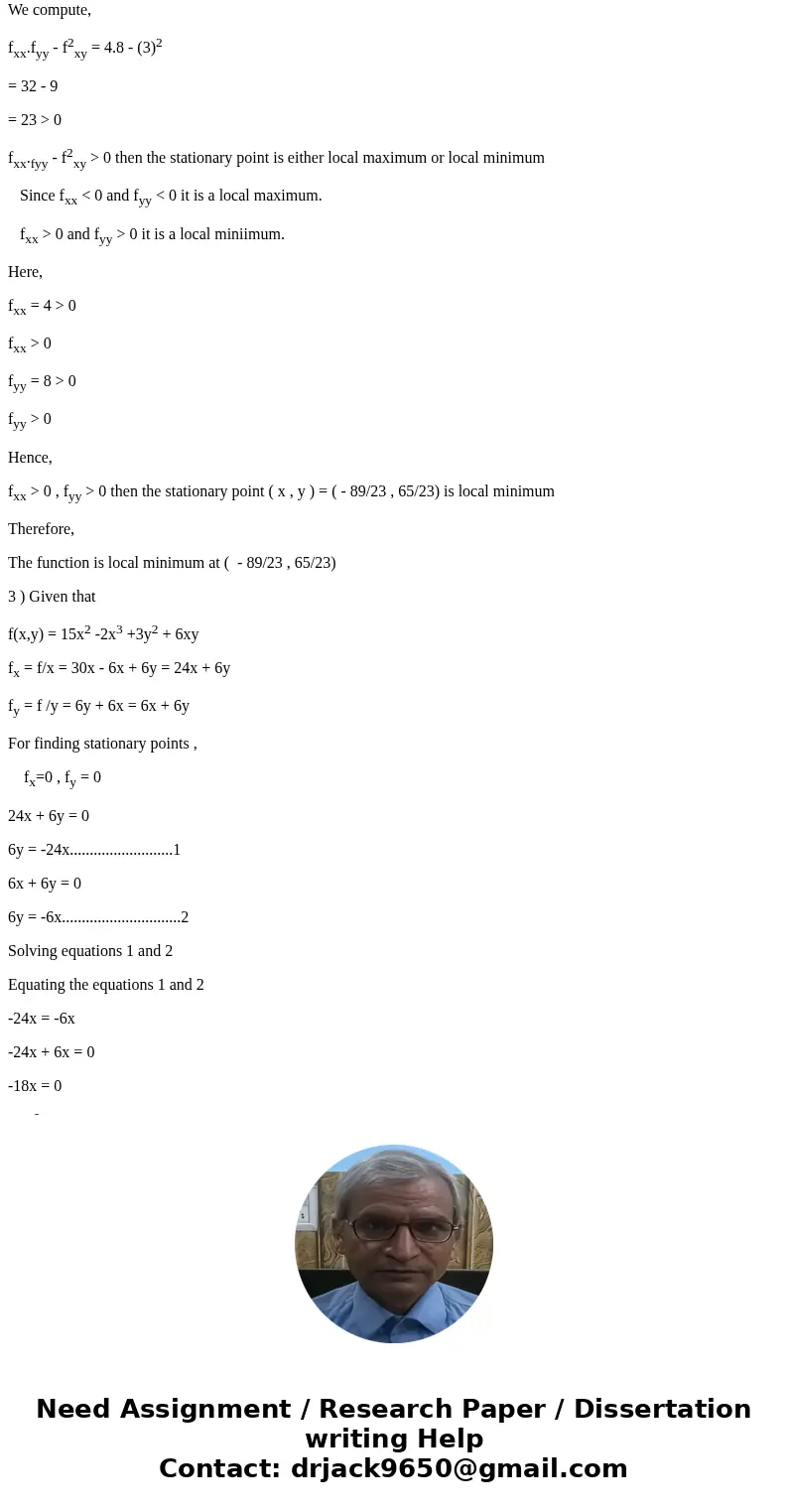
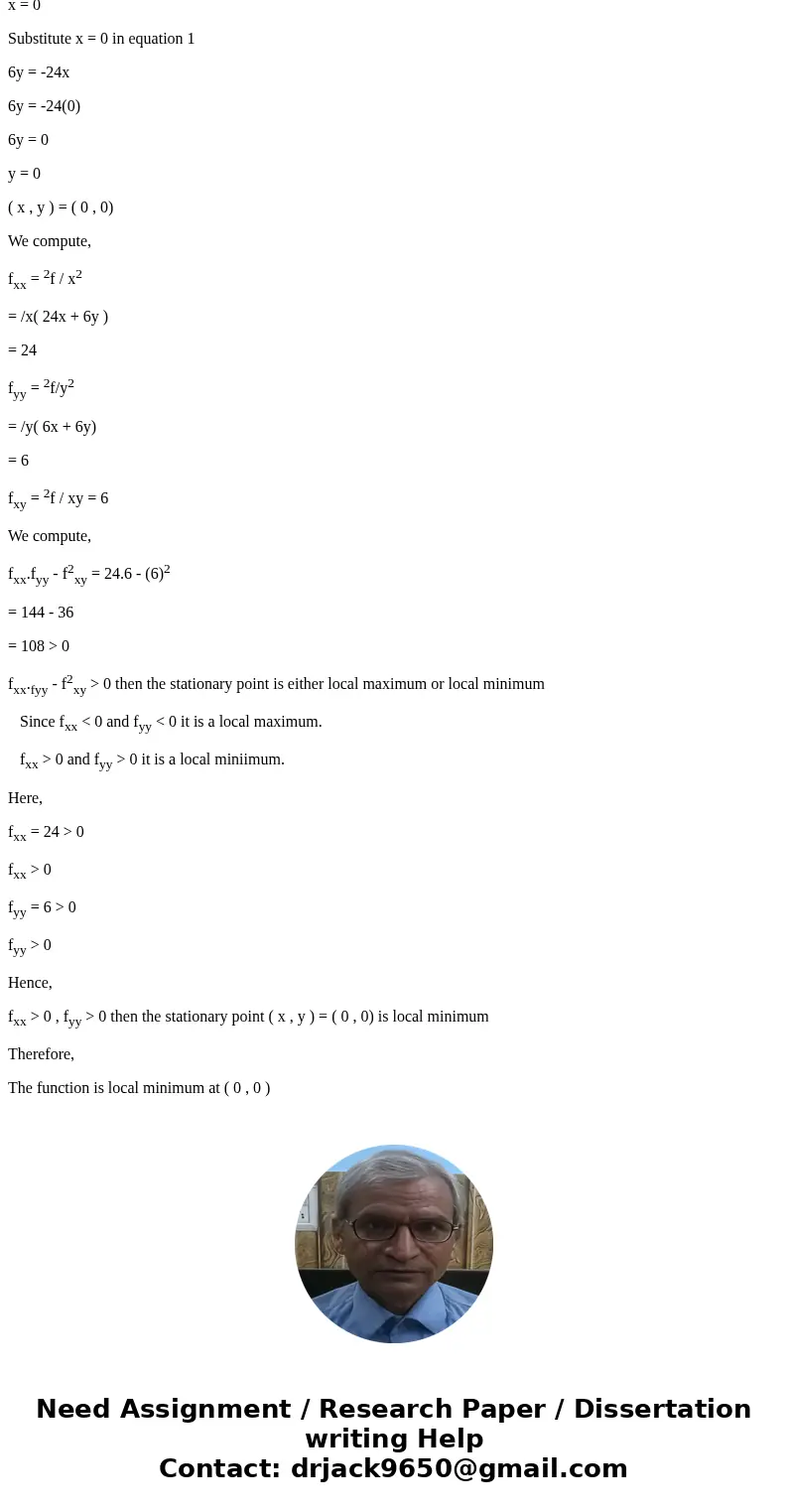
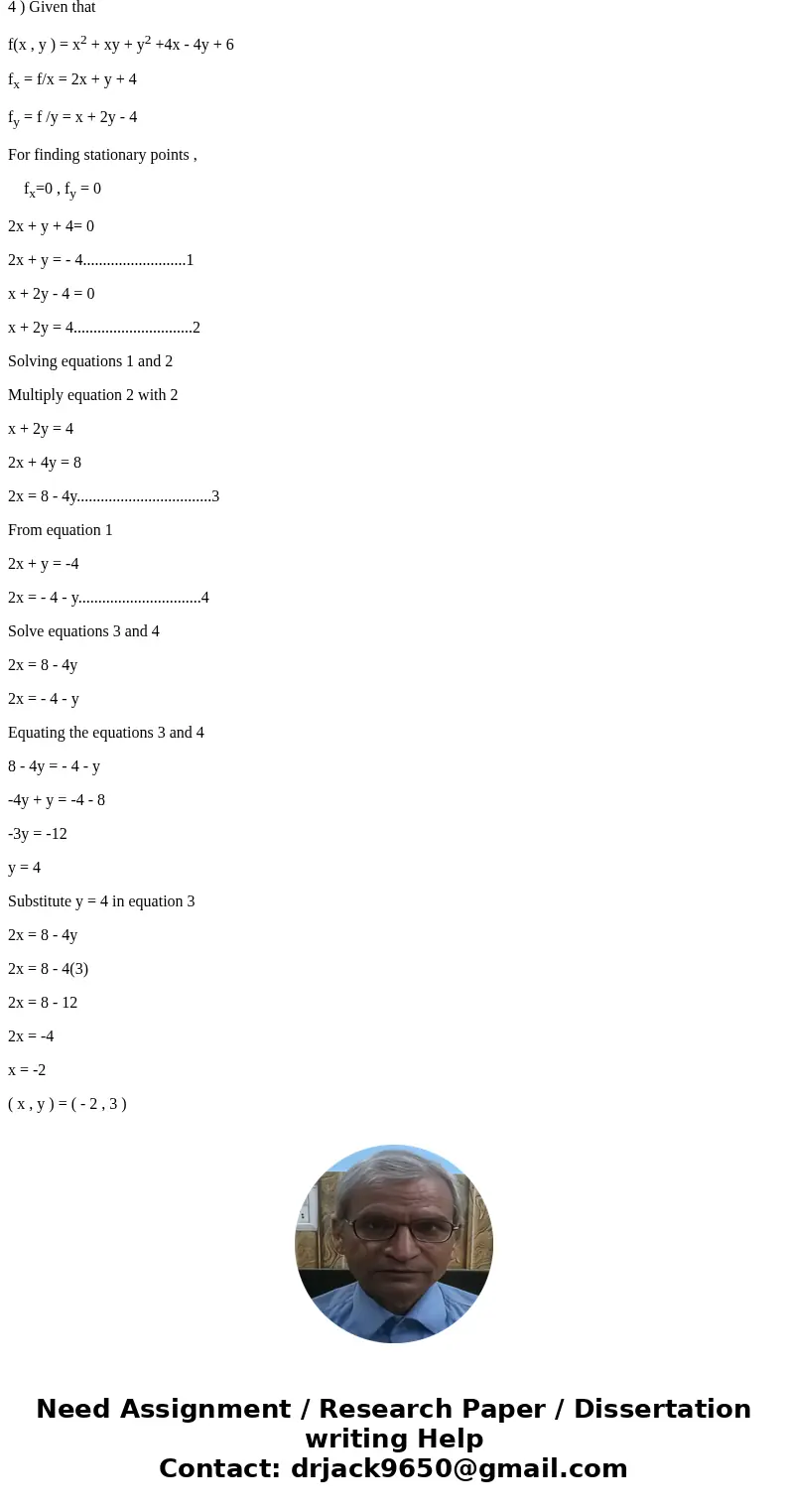
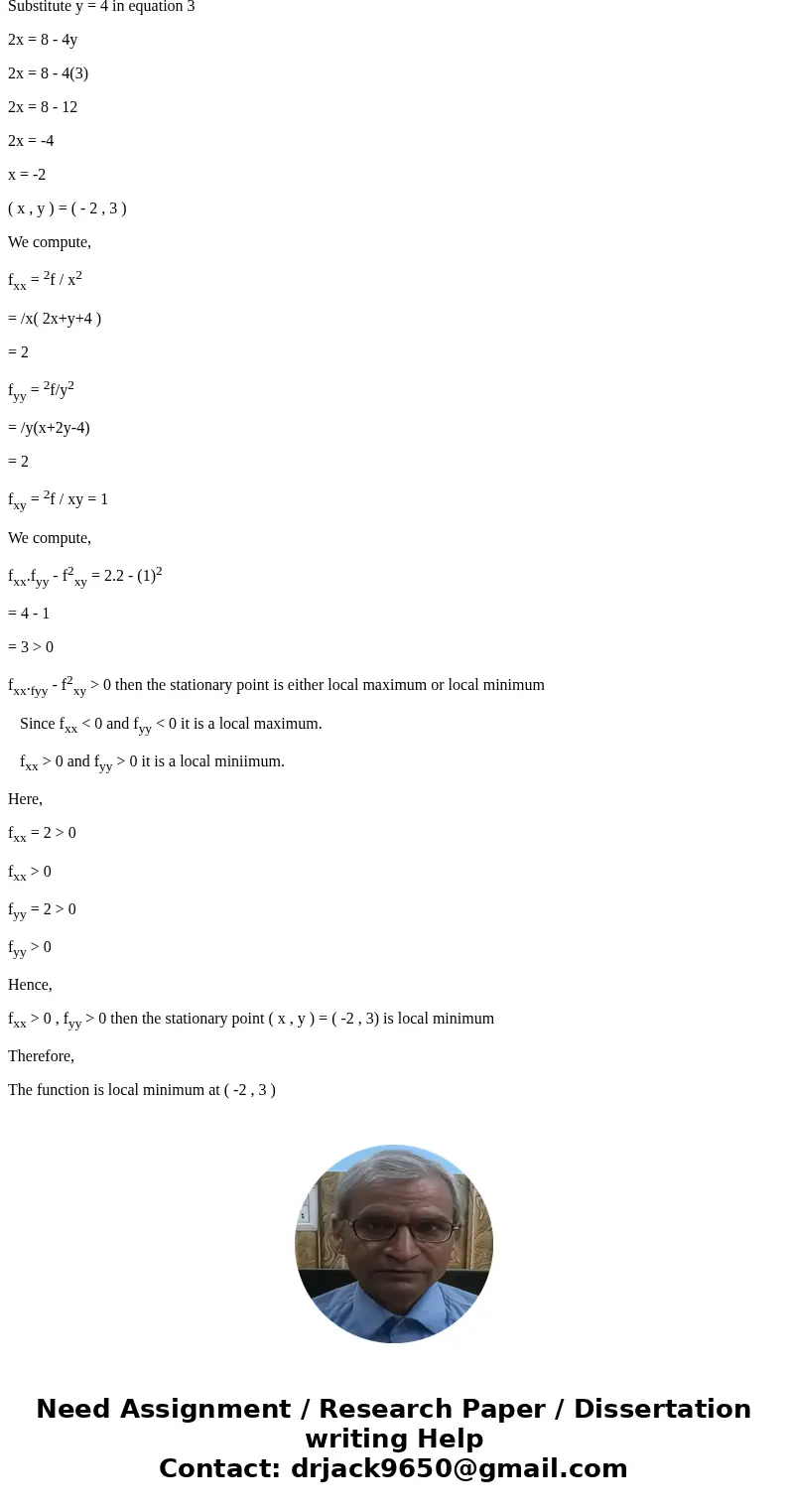
 Homework Sourse
Homework Sourse